This document may be printed, photocopied, and disseminated freely with attribution. All content is the property of the McCormick Center for Early Childhood Leadership.
Nationally, early childhood education leaders are working to define the profession and establish a unified professional framework for the workforce. The “North Star” vision for all lead early educators is a minimum of a bachelor’s degree in early childhood education (Friedman-Krauss, Barnett, Weisenfeld, Kasmin, DiCrecchio, & Horowitz, 2018). While this offers clarity to the field regarding teachers and pedagogical leaders, it does not address issues regarding the requisite professional preparation and continuing education of program administrators responsible for the administrative leadership of early childhood programs.
Consideration of early childhood program administrators has been noticeably absent from much of the recent discussion about the workforce crisis, including the preparation, ongoing support, and compensation needed to stabilize the profession. Bearing in mind the impact on organizational climate, program development and sustainability, as well as the influence of directors, family child care professionals, and school principals on teaching and learning, it is reasonable that site-based program leaders should be factored into a reimagined and transformed workforce. Minimally, general education requirements should include a bachelor’s degree, specialized education and training in early childhood education and child development, and specialized education and training in program administration. Requisite qualifications for early childhood program administrators should at least match, if not exceed, those of early childhood teachers.
There is a lack of consistent policies and supports for improving the qualifications and competencies of those who lead early childhood programs, resulting in a leadership gap. The gap is most evident between early childhood center administrators and elementary school principals serving Pre-K children (Abel, Talan, Pollitt, and Bornfreund, 2016; Lieberman, 2017). In addition, with recent advances in the requisite qualifications for publicly-funded early childhood teachers, a qualifications gap is beginning to emerge between teachers and center-based administrators. It is essential that the qualifications for program administrators keep pace with those of teachers and that program administrators also receive specialized education and training in leadership and management.
Four years ago, the McCormick Center for Early Childhood Leadership published a report on the status of early childhood leadership in all fifty states and the District of Columbia. The report included information about five policy levers that identify the minimal qualifications for administrators in child care licensing standards, state administrator credentials, principal licensure, quality rating and improvement systems (QRIS), and state-funded Pre-K programs. Closing the Leadership Gap: 2017 Status Report on Early Childhood Program Leadership in the United States (Abel, Talan, and Newkirk, 2017) highlighted the extent of the leadership gap and reported on key policy differences that brought the problem center-stage.
The current 2021 study provides an updated report on the status of early childhood program leadership in the United States. Specifically, this study looks at whether there have been any changes to states’ ratings on the five policy levers indicating a more unified professional framework for site-based program leaders since the initial study was conducted in 2017.
The research team studied documents available electronically on the websites of state legislatures, administrator credentialing programs, QRIS initiatives, departments of education, human services, and early childhood development and learning, as well as the QRIS Compendium and the New America Pre-K Policy Scan. The data collected from these sources were used to update each of the five policy lever rubrics for each state on the L.E.A.D. Early Childhood Clearinghouse (McCormickCenter.nl.edu). Based on these updated rubrics, each state was given an overall policy rubrics score which was examined for changes from 2017 to 2021.
National Profile
While the early childhood education profession was moving toward acceptance of the BA in early childhood education as the standard for lead teachers, there was no agreement about early childhood program leaders’ requisite competencies and education. Instead, federal and state regulatory systems had created a wide array of standards for individuals leading programs for children, birth through age eight. Professional preparation standards for elementary school principals were consistently more robust than those for center- or home-based program leaders. While the vast majority of states required elementary school principals to have a graduate degree in education, only New Jersey required a licensed center director to have a bachelor’s degree. However, this requirement applied only if the program served more than thirty children. Advancements in standards for administrators of child care programs, primarily seen in voluntary state QRIS and state-funded Pre-K, had not led to substantial improvements in the basic qualifications of early childhood program administrators.
In 2017, no state scored higher than six (out of ten) on their state-specific, overall policy levers rubric. Three states—California, Illinois, and Pennsylvania—achieved the highest overall policy levers score (range of 5-7). Table 1 provides the scoring rubric used to determine each state’s overall policy levers score.
Policy Levers
States’ policies regarding the professional requirements for early childhood program administrators were assessed on five policy levers:
The five policy levers were derived from the recommendations of the 2015 National Academy of Medicine report, Transforming the Workforce for Children Birth through Age 8 (Institute of Medicine and National Research Council, 2015). This report called for a unifying foundation for all lead educators—inclusive of center directors, principals, and family child care professionals—having a minimum of a bachelor’s degree with content knowledge and competency in child development/early childhood education. Additional competencies, depending on role, were also required. The five policy levers and the scoring rubrics addressed the need for early childhood program leaders across sectors to have a BA degree and competencies in both child development/early childhood education and program administration. The goal of reporting each state’s overall policy levers score was to encourage thought leaders, policymakers, and advocates to tear down the silos and take a cross-sector, systems approach to improving the qualifications, competencies, and ongoing professional development of early childhood program leaders.
Administrator Qualifications in Child Care Licensing Standards (2017)
Administrator Credential (2017)
Principal Licensure (2017)
Administrator Qualifications in QRIS (2017)
Administrator Qualifications in State Pre-K Programs (2017)
National Profile
Today there is consensus on a unifying framework for the early childhood profession. The Unifying Framework for the Early Childhood Education Profession (PowerToTheProfession.org) clearly defines the standards, qualifications, roles, compensation, and supports for members of the early childhood profession working with children from birth through age eight. While this unifying framework is inclusive of instructional or pedagogical leaders, it does not encompass the requisite competencies, education, compensation, and supports for early childhood program administrators—those with overall responsibility for leading early childhood education and care programs situated in child care centers, family child care homes, and elementary schools. Professional preparation standards for elementary school principals continue to be far more robust than those for center- or home-based program leaders. There is still only one state, New Jersey, that requires a licensed center director to have a bachelor’s degree (if the program serves more than thirty children). One emerging trend in child care licensing is the bifurcation of the administrative role into two required positions (depending on the number of children served), one responsible for pedagogical leadership and one for administrative leadership (Delaware, New Jersey, and Rhode Island).
In 2021, only Illinois, scored a seven (out of ten) on the state-specific, overall policy levers rubric. Only two states—Illinois and Pennsylvania—scored between five and seven on their overall policy levers rubric. While the national picture shows little variation over the past four years, zooming in to specific benchmarks within each state’s policy rubrics reveals small changes in required standards or policies, suggesting subtle movement toward increased professional qualifications and supports for early childhood program leaders. Tables 2-6 provide counts, percentages, and lists of states that meet each of the benchmarks found within the five policy lever rubrics. Below are some highlights from the 2021 policy scan.
Administrator Qualifications in Child Care Licensing Standards (2021)
Administrator Credential (2021)
Principal Licensure (2021)
Administrator Qualifications in QRIS (2021)
Administrator Qualifications in State Pre-K Programs (2021)
Taking a macro view, the early childhood program leadership gap is just as large in 2021 as it was in 2017. The overall policy levers score went up in six states and down in seven states. In four years, no state achieved an overall policy levers score in the top quartile (range of 8 – 10). Zooming in to the micro view, however, there were small advances toward a more unified professional framework for program leaders working across sectors. In child care licensing, administrative intensity is beginning to be addressed. Additional administrators (variously called Education Coordinator, Head Teacher, or Group Teacher) are required based on the number of children served in the licensed child care program. This position, not to be counted in teacher: child ratios, provides pedagogical leadership and has the same or more stringent educational requirements as the Director. The additional administrative role, regardless of title, creates a “leadership bench” to ensure adequate capacity to carry out essential leadership functions. Momentum in administrator credentialing also appears to be growing: three more states offer a voluntary administrator credential (New Mexico, Texas, and Utah), one more state requires a minimum of an associate degree (New York), and the majority of state administrator credentials are now competency-based.
Three policy recommendations are emerging from the updated L.E.A.D. Early Childhood Clearinghouse data. First, there is a pressing need for a unifying foundation of administrative qualifications and competencies reflecting a whole leadership approach across sectors. A competent early childhood program leader working in a school, center, or licensed home needs core knowledge and skills in child development, early childhood pedagogy, leadership essentials, and program administration. Second, the silos of program standards by sector for early childhood administrators can best be eliminated by considering the five policy levers together. Third, attention to leadership capacity—multiple and differentiated leadership positions based on consistent criteria—will need to be addressed in future policy scans of early childhood program leadership.
This brief summarizes changes in state policies regarding program leadership since the findings from the cross-sector policy scan were first disseminated in 2017.
If you find errors in how your state is represented in the updated policy scan, we welcome your input! Please contact teri.talan@nl.edu to provide additional information about your state’s policies concerning the professional preparation and ongoing support of early childhood education and care (ECEC) program leaders working in schools, centers, and homes. Our team will keep updating the L.E.A.D. Early Childhood Clearinghouse database with new information from your responses. Information you provide will greatly aid our efforts to track progress toward the “North Star vision” of a unifying professional framework for ECEC program leaders.
Table 1. Policy Lever Rubric
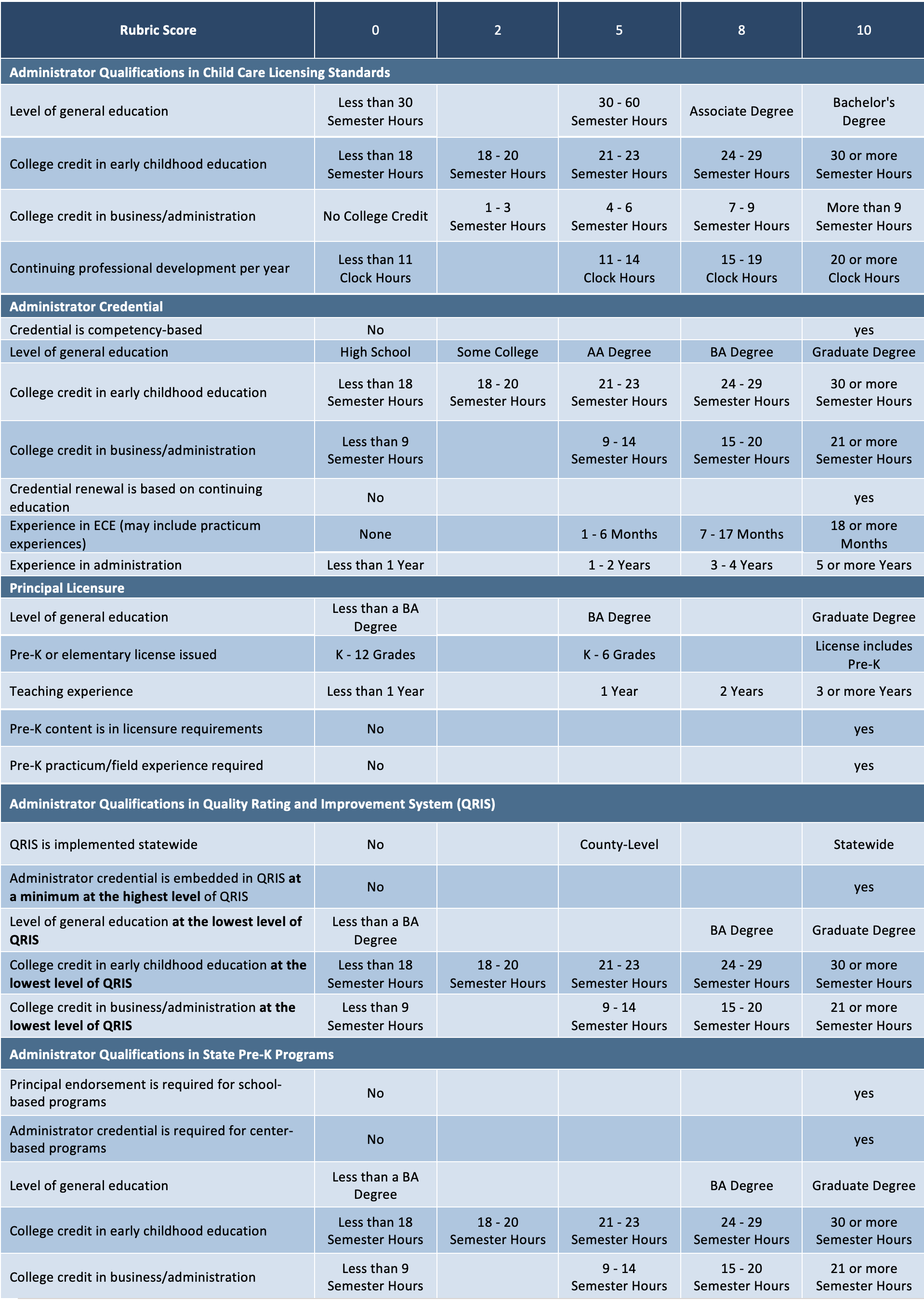
Table 2. Administrator Qualifications in Child Care Licensing Standards (2021)
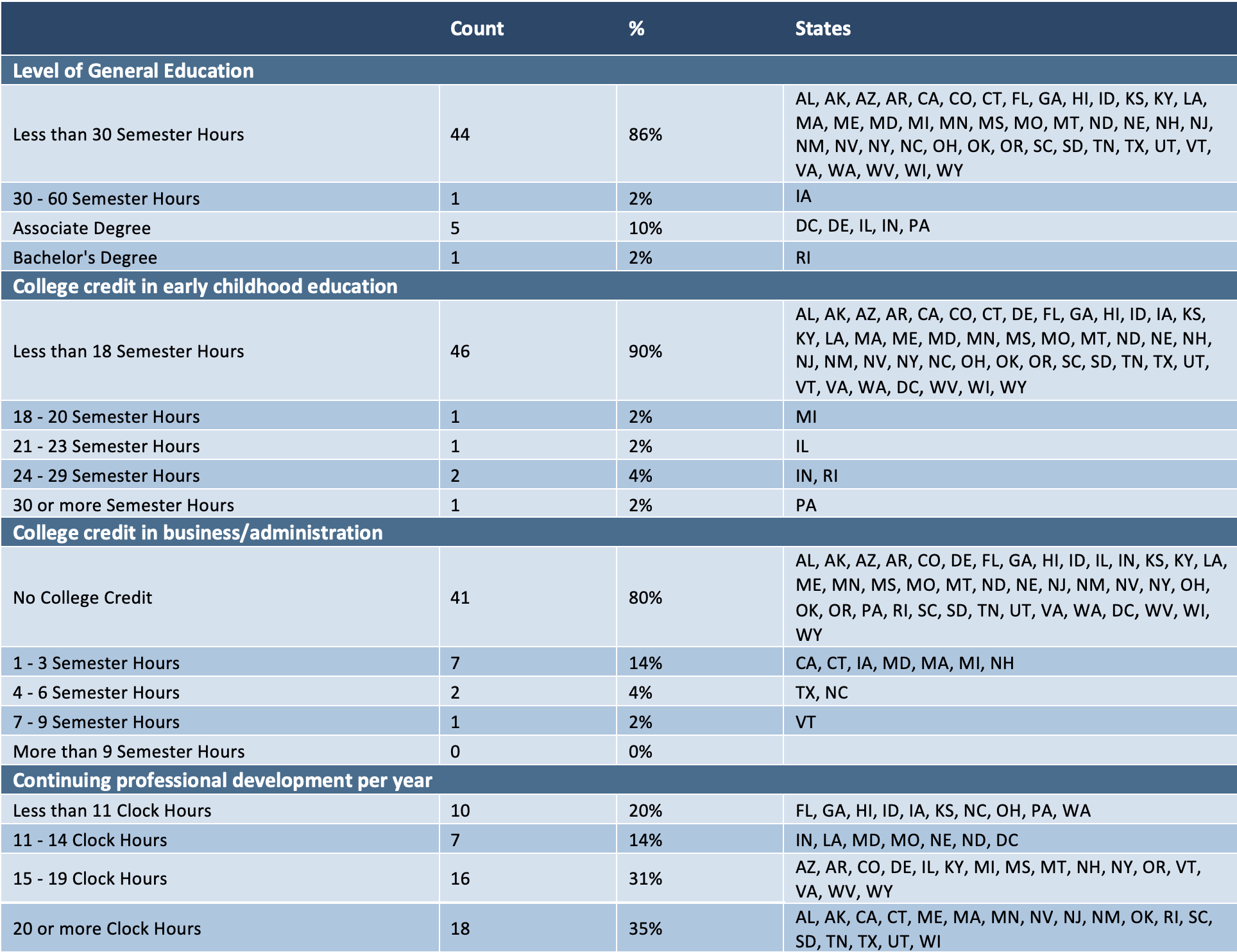
Table 3. Administrator Credential (2021)
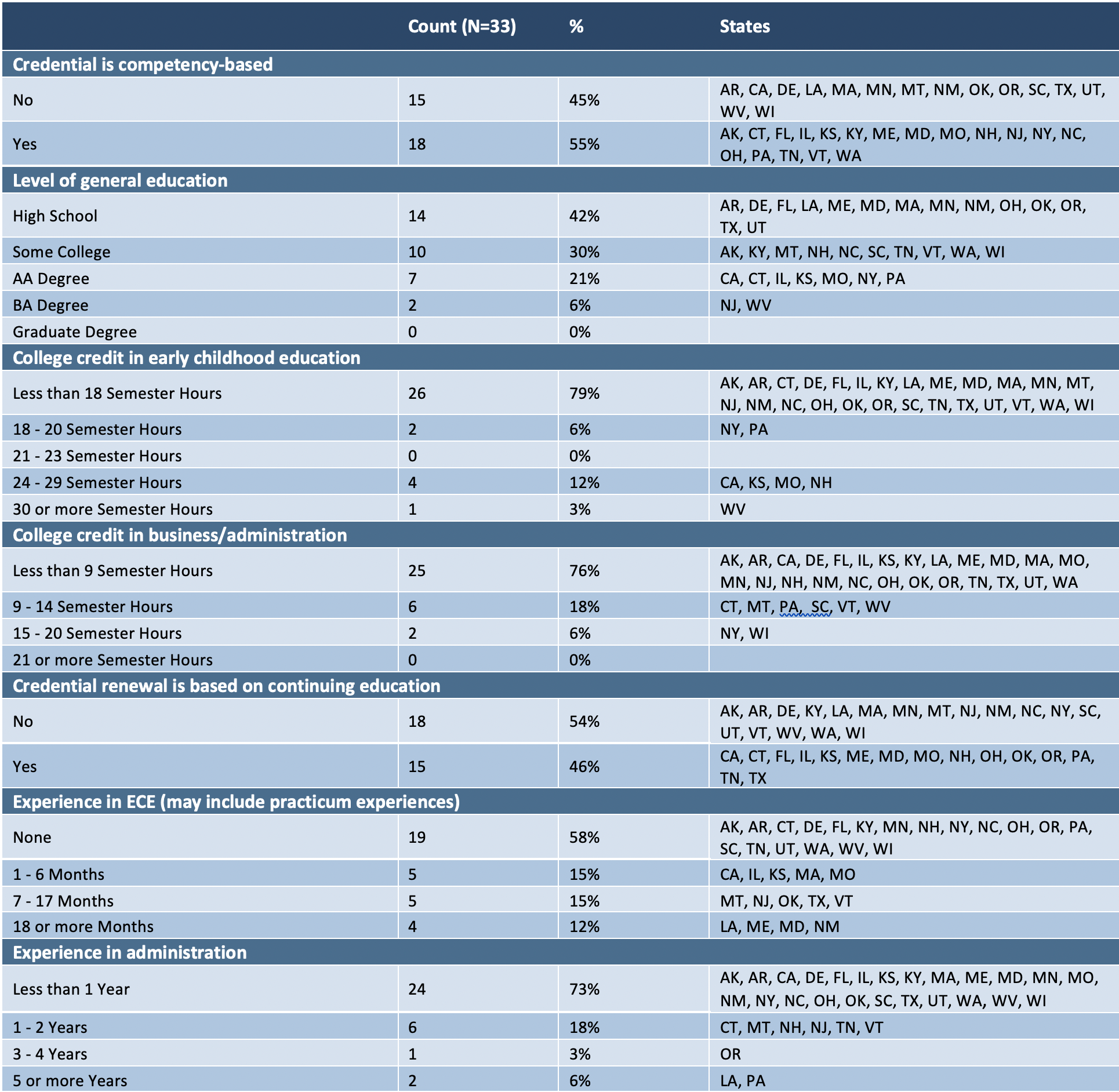
Table 4. Principal Licensure (2021)
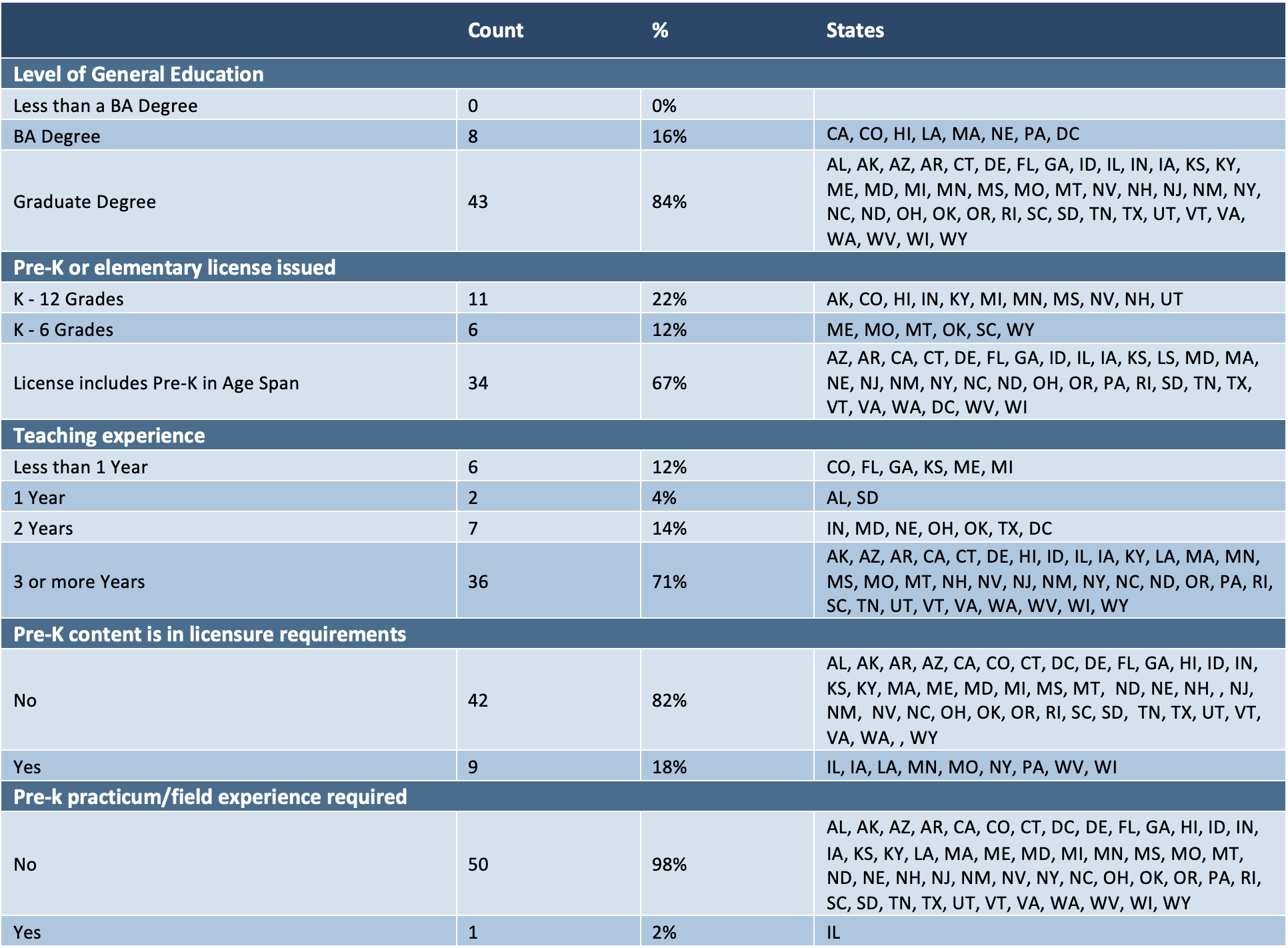
Table 5. Administrator Qualifications in Quality Rating and Improvement Systems (2021)
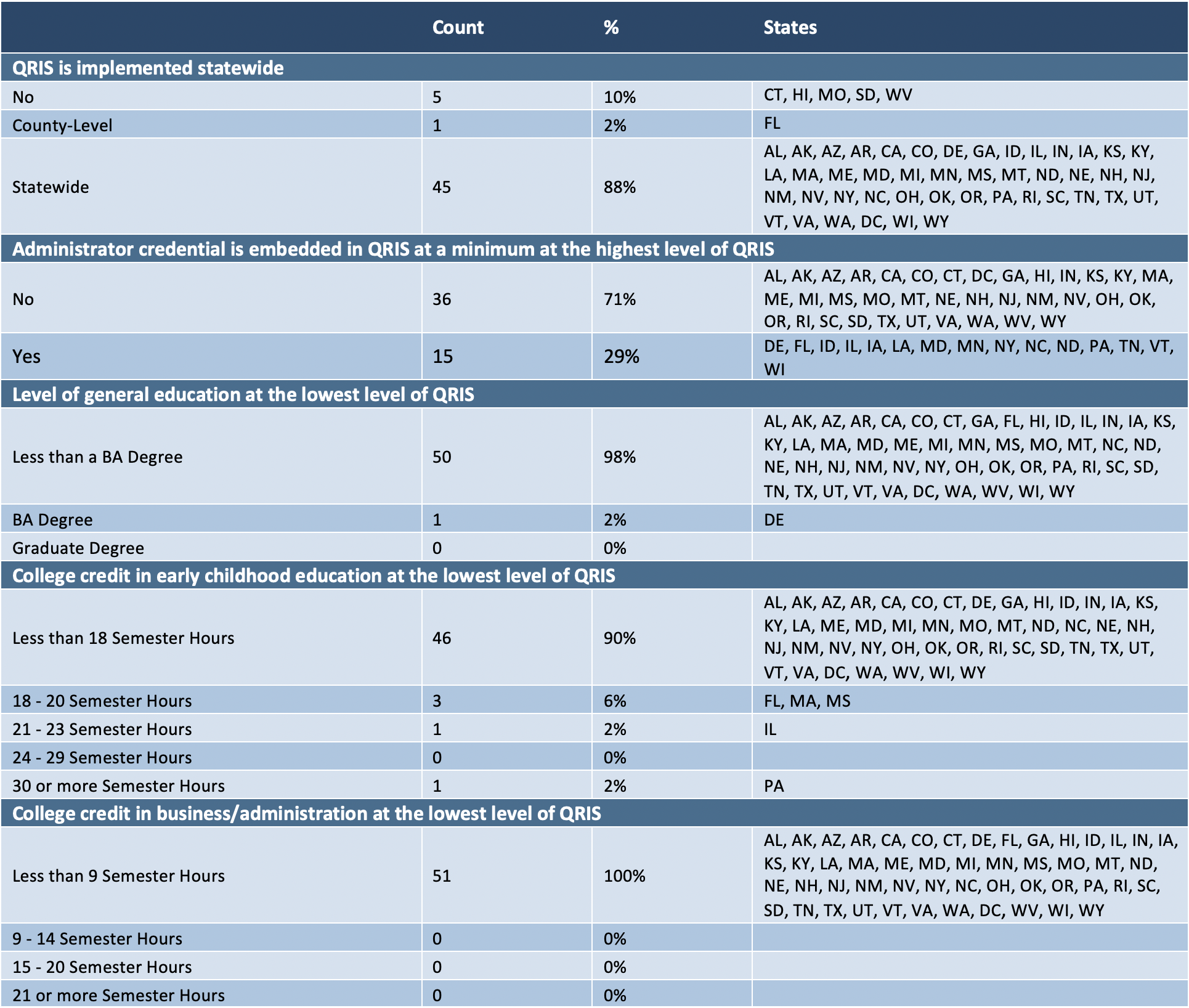
Table 6. Administrator Qualifications in State Pre-K Programs (2021)
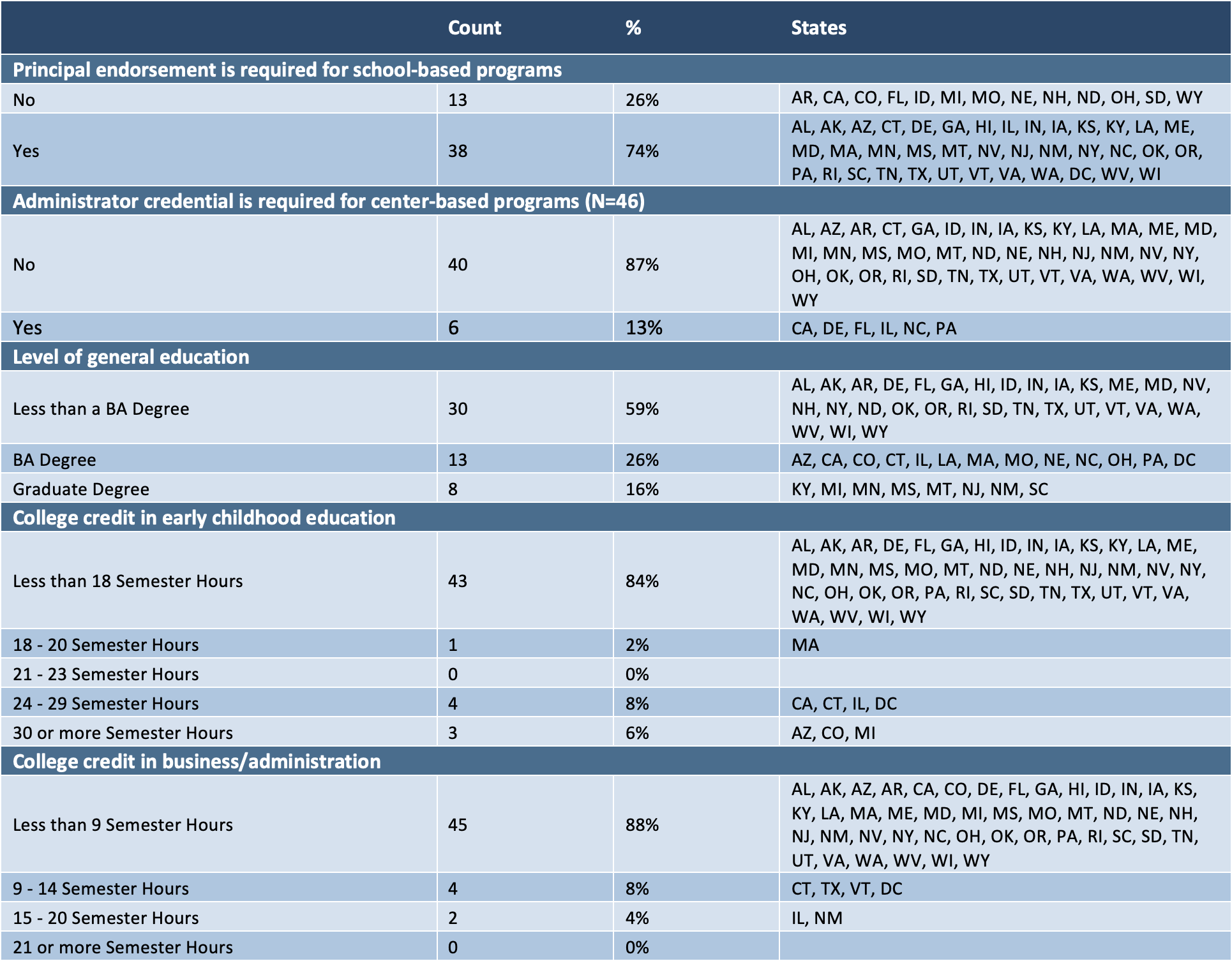
Abel, M. B., Talan, T. N., & Newkirk, M. K. (2017). Closing the Leadership Gap: 2017 Status Report on Early Childhood Program Leadership in the United States. Wheeling, IL: McCormick Center for Early Childhood Leadership, National Louis University.
Abel, M. B., Talan, T. N., Pollitt, K. D., & Bornfreund, L. (2016). National principals’ survey on early childhood instructional leadership: Executive summary. McCormick Center for Early Childhood Leadership Publications. Paper 1. http://digitalcommons.nl.edu/mccormickcenter-pubs/1
Build Initiative & Child Trends (2019). A catalog and comparison of quality initiatives (data systems). Retrieved from http://qualitycompendium.org/on 11/11/2021.
Friedman-Krauss, A.H., Barnett, W.S., Weisenfeld, G.G., Kasmin, R., DiCrecchio, N., & Horowitz, M. (2018). The state of preschool 2017: State preschool yearbook. New Brunswick, NJ: National Institute for Early Education Research.
Institute of Medicine and National Research Council (2015). Transforming the workforce for children birth through age 8: A unifying foundation. Washington, DC: The National Academies Press.
Lieberman, A. (2019). Preparing principals for Pre-K in Illinois. Washington, DC: New America. Retrieved from https://newamerica.org/education-policy/reports/preparing-principals-pre-k-illinois/
Lieberman, A. (2017). A tale of two pre-K leaders: How state policies for center directors and principals leading pre-K programs differ and why they shouldn’t. Washington, DC: New America.
Masterson, M., Abel, M., Talan, T., & Bella, J. (2019). Building on whole leadership: Energizing and strengthening your early childhood program. Lewisville, NC: Gryphon House.
McCormick Center for Early Childhood Leadership. L.E.A.D. Early Childhood Clearinghouse. Retrieved from https://mccormickcenter.nl.edu/lead/closing-the-leadership-gap/
New America Pre-K Leader Policy Scan. Retrieved from https://www.newamerica.org/in-depth/pre-k-leaders/pre-service-requirements/